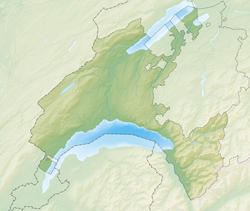Oron, Vaud
| Oron | ||
|---|---|---|

Church in Oron-la-Ville
|
||
|
||
| Coordinates: 46°34′N 6°50′E / 46.567°N 6.833°ECoordinates: 46°34′N 6°50′E / 46.567°N 6.833°E | ||
| Country | Switzerland | |
| Canton | Vaud | |
| District | Lavaux-Oron | |
| Government | ||
| • Mayor | Syndic | |
| Area | ||
| • Total | 24.59 km2 (9.49 sq mi) | |
| Elevation | 631 m (2,070 ft) | |
| Population (Dec 2015) | ||
| • Total | 5,309 | |
| • Density | 220/km2 (560/sq mi) | |
| Demonym(s) | Oronais, Oronaises | |
| Postal code | 1610, 1612 | |
| SFOS number | 5805 | |
| Surrounded by | Auboranges (FR), Chapelle (Glâne) (FR), Palézieux, Rue (FR), Vuibroye | |
| Twin towns | Bussac (France) | |
| Website |
http://www.oron.ch Profile (French), SFSO statistics |
|
Oron is a municipality in the district of Lavaux-Oron in the canton of Vaud in Switzerland. It was formed on 1 January 2012 when the former municipalities of Bussigny-sur-Oron, Châtillens, Chesalles-sur-Oron, Ecoteaux, Oron-la-Ville, Oron-le-Châtel, Palézieux, Les Tavernes, Les Thioleyres and Vuibroye merged.
Bussigny-sur-Oron is first mentioned in 1433 as Bussignye. In 1517 it was mentioned in a land registry of Count Jean II de Gruyère. Châtillens is first mentioned in 1141 as Castellens. The village of Chesalles-sur-Oron was first mentioned in 1330 when the surrounding land was acquired by the Bishop of Lausanne. Ecoteaux is first mentioned in 1134 as Escotaux. Oron-la-Ville is first mentioned about 280 as Uromago. In 1018 it was mentioned as Auronum. Oron-le-Châtel is first mentioned in 1137 as Oruns. Palézieux is first mentioned in 1134 as de Palaisol.
Oron has an area of 24.59 km2 (9.49 sq mi).
Oron has a population (as of December 2015[update]) of 5,309.
The historical population is given in the following chart:
The Temple of Oron-la-Ville, Oron Castle and its library, the Cistercian abbey of Haut Crêt are listed as a Swiss heritage site of national significance. The entire old town of Oron-le-Châtel is part of the Inventory of Swiss Heritage Sites.
...
Wikipedia




